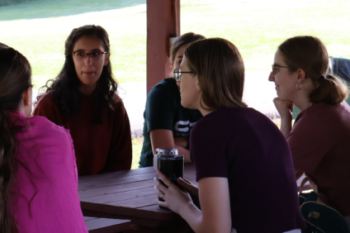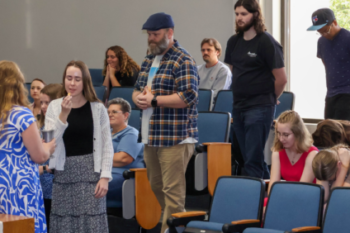Embracing Aging
In a picture from the fall of 1974, I am standing next to my father outside the dormitory as my parents are about to leave me to begin my first year of college. As part of the “Baby Boom Generation” (born between 1946 and 1964), I was just one of approximately eight million first-year college students that day. By 1964, the last year of the “Baby Boom,” we accounted for nearly 40% of the United States population. Now, almost 50 years later, I am older than my father was in the picture, my son is older than I was, and the rest of the “boomers” are right there with me. In 2018, the U.S. Census Bureau reported that “Every day in the United States approximately 10,000 Baby Boomers turn sixty-five. This began in 2011 and will continue until 2030 so that by 2035 there will be more people over sixty-five than under eighteen.” [1] An increase in the aging population is not just a fact in the United States; it is a global phenomenon. As reported by the World Health Organization, “In 2019, the number of people aged 60 years and older was one billion.” [2] That number is projected to double by the year 2050. Writing about this increasing elderly population, gerontologist and author Kenneth Dychtwald observed that from its beginning, “the force of this demographic quake has been reverberating through society’s institutions. Although it began as a straightforward boom in births it is now rising into an age wave destined to crash on society’s shores, transforming most things in its path.” [3]
Obviously, all churches are included in this path. As their members age, the question will be, how intentional are we in recognizing the needs and opportunities of this age wave? While I appreciate many of the attempts churches make to address the needs of seniors, I am afraid that to this current point we are falling short of the challenge. A ministry that simply takes the seniors to see the fall foliage once every year is not enough. Rather than being “siloed off” as a group to be attended to, this generation needs to be called to significant, self-giving ministry.
Rather than being “siloed off” as a group to be attended to, this generation needs to be called to significant, self-giving ministry.
Much of the attention given to the aging process in Western culture demonstrates a commonly held view that this period of life is characterized by physical decline, disease, loss, and disengagement from normal routines. Just think of the many birthday cards that include some ageist phrase having to do with “being over the hill.” In a time of increasing medical technology we live with a double bind: these advances are allowing us to live longer, but we are unable to think about aging as positive. Basically, we want to live longer; we just don’t want to get old while we do. In contrast, as observed by Biblical scholars Richard and Judith Hays, “Nowhere in the biblical canon are its older characters pitied, patronized, or treated with condescension. Nowhere is growing old itself described as a problem.” [4]
By coming to accept and even value our own aging and the aging of others, we may begin to see God’s presence and God’s work through us, regardless of age. That begins with a willingness to accept the undeniable fact of our own aging, honestly and unabashedly. As stated by Fritz de Lange:
A lack of love for our own aging can be an important obstacle – a blind spot- in the care we owe to the frail elderly. We may not understand them and may refuse to be near them because we are instinctively turning away from what reminds us of the experience of aging. The more we learn to accept graciously our own aging, the more easily we are able to understand what is needed in caring for the elderly, and ready to promote their good. [5]
By coming to accept and even value our own aging and the aging of others, we may begin to see God’s presence and God’s work through us, regardless of age.
I do not think that “love for our own aging” begins all at once, and there is often a distance between what we know as fact and what we can accept emotionally. I do not particularly like to think about myself ten to maybe twenty years from now. I am afraid of my aging, and I fear dying. However, I am noticing that as the reality becomes more difficult to deny, it is becoming easier to accept. Popular notions like “positive aging,” “successful aging,” and other catch phrases are often used to challenge the rhetoric of decline. To me, those “cheerful” slogans seem performance-based, individualistic and somewhat “anti-aging” rather than “loving our aging.” I certainly intend to do the best I can to take good care of myself and be “positive” in the years ahead, but no measure of a healthy lifestyle and positive attitude will combat the unavoidable. . . I am aging. I will die. In the words of T. R. Cole, “This paradox cannot be eradicated by the wonders of modern medicine or by positive attitudes about growing old.” [6]
My is hope that the church will see these friends as teachers, instructing others not just in how to give care but in how to receive it.
As the number of seniors in our congregations continues to increase in the coming years, they will give testimony to all of our own aging. My is hope that the church will see these friends as teachers, instructing others not just in how to give care but in how to receive it. Just as the blind should remind us of our lack of vision, and the poor remind us of our poverty, the old among us remind us of our aging. The old remind us of our aging. Perhaps that is a slogan we can adopt.
[1] United States Census Bureau, “Older people projected to outnumber children for first time in U.S. history” (March 2018).
[2] https://www.who.int/health-topics/ageing#tab=tab_1 (accessed 1/2/2023)
[3] Dychtwald, Ken. “The Age Wave Is Coming.” Public Management 85, 6 (2003): 6.
[4] Hays, Richard and Hays, Judith. “The Christian Practice of Growing Old: The Witness of Scripture,” in Growing Old in Christ, eds. Stanley Hauerwas et al. (Grand Rapids: Eerdmans, 2003), 3.
[5] de Lange, Frits. “Loving Later Life: Aging and the Love Imperative.” Journal of the Society of Christian Ethics 33, 2 (2013): 178.
[6] Cole, Thomas R. The Journey of Life: A Cultural History of Aging in America (Cambridge: Cambridge UP, 1992), 239.
Dr. Jack Holland is the Russell F. and Marian J. Blowers Professor of Christian Ministries; Professor of Christian Care and Counseling at Emmanuel Christian Seminary at Milligan. View Emmanuel’s Academic Programs page here.





